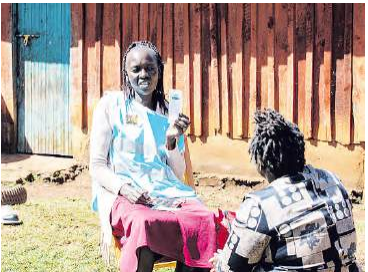
The presence of Evelyne Kangogo brings both comfort and curiosity. She carries a large blue backpack, stocked with a weighing scale, an infrared clinical thermometer, Muac tape, elastoplast, some drugs and an assortment of family-planning products.
It appears too big for her small frame. “It is not heavy,” she says with a chuckle.
She is one of the 1,200 community health promoters hired by the Elgeyo Marakwet government to reach remote villages with health promotion messages.
When she enters a homestead, Kangogo greets each person present with a smile and introduces herself.
She then enquires how they are doing. Is there any health problem, have they registered for Social Health Authority?
She then sits with women between 19 and 49 years in the homestead to talk about family planning options. She listens patiently, answering questions, calming fears and sharing stories of families that have benefited from the choices available.
Today, she is also talking about DMPA-SC ( Depo-Medroxyprogesterone Acetate- Subcutaneous), also simply known by its brand name Sayana Press.
This is a new self-injectable contraceptive that prevents pregnancy for up to three months. It comes in a small, light and easy-to-use device that women can use to self-inject at home.
They do not need to go to the hospital every three months. Elgeyo Marakwet is one of the counties piloting DMPA-SC as an extra choice for women seeking an alternative method of contraception.
Currently, only 57 per cent married women use any form of modern contraception. Kenya Demographic and Health Survey of 2022 also showed Kenya has an unmet need for family planning of 14 per cent.
The country is seeking to reduce the unmet need to single digits by 2030 and increase the rate of modern contraception use to 64 per cent by 2030.
CHPs have now become the most promising human resource in promoting family planning options to help Kenya reach the 2030 targets. Marie Stopes, a non-profit with reproductive health programmes in Kenya, supports counties to improve contraception access by training the CHPs.
The CHPs then pass on the knowledge to men and women in villages. The organisation also organises community engagement forums where adult women and men speak freely about contraception.
Joseph Wanjala, the Marie Stopes public sector strengthening supervisor in North Rift, says they have conducted trainings of health workers on DMPA-SC in at least seven counties.
The others are Nandi, Murang’a, Nairobi, Bungoma, Kwale and Tana River. “For CHPs, we are only sensitising them about all methods including this new commodity in the market.
We are just sensitising them when they have their meetings. We are even giving them samples so that they can go and show the community,” he says. The CHPs usually refer interested clients to health facilities.
“DMPA-SC clients first come to the health facility and they are taught how to inject themselves. The second time they also come to the facility and inject themselves before the health worker,” he says.
“After that they are able to carry some doses at home
and they will be able to inject themselves. This will
reduce the time they consume coming to the facility
and also the waiting time to be served.”








